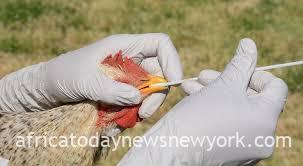In some regions of Kebbi State, there are purported findings of avian influenza, a disease known for its deadly impact on animals.
Dr. Alheri Ibrahim-Sanchi, serving as the state’s Veterinary Services Director within the Ministry of Animal Husbandry, underscores the government’s heightened measures to mitigate its spread.
The announcement took place on Saturday as he briefed journalists following the fumigation of a farm afflicted by the disease in Amanawa village, Kalgo, on the outskirts of Birnin Kebbi.
According to his statement, the disease had caused the deaths of 14 peacocks within the affected facility. The fumigation task was executed by a skilled team of professionals following the “One Health” strategy, which included experts from the Ministries of Animal Husbandry, Health, Environment, and Information, alongside Principal Partners.
Ibrahim-Sanchi stressed the primary focus of the operation: to limit the spread’s reach. He elaborated on reports of ailing peacocks and an alarming mortality trend, prompting the mobilization of veterinary professionals for initial assessment.
“Upon investigation, we found it necessary to take samples, and those samples were sent to the Veterinary Diagnostic Reference Laboratory in Jos.
Read also: Kebbi State Suspends Mining Activities As Insecurity Persists
“When those samples were analysed, unfortunately for us, they returned positive for ‘Highly Pathogenic Avian Influenza (H5N1)’, so, this is what necessitated this exercise, to first of all come to the scene where these birds were resident and do the needful.”
The director said the main task was to ensure that the incident did not go beyond the affected facility, assuring residents that the team would go ahead and take active surveillance, “which is a pattern of seeking for other likely cases that may be occuring in our state.”
He said that considering the fact that “highly pathogenic avian influenza is zoonotic infection that has the tendency to spread to humans”, the team had also undertaken the veterinary component of it, while colleagues in human health would identify individuals in contact with the animals for necessary action.
Ibrahim-Sanchi appealed to poultry owners to remain calm but be vigilant and intensify bio-security, adding that “it is a disease that potent high economic loss for poultry owners.”
He recommended that poultry farmers exchange information within their community and limit the number of visitors to their farms to reduce potential risks.
The director also stressed the need for them to curtail bird movement and refrain from sharing farm implements to prevent disease transmission.
Ibrahim-Sanchi also mentioned that the ministry, collaborating with sister ministries and agencies like the Ministry of Health, Environment, and Information, along with major partners, was undertaking efforts to inform the public about the disease.
Also, in an interview, the Director of Public Health, Kebbi Ministry of Health, Abubakar Bagudu-Muhammad, confirmed that the disease had the potency to affect humans, adding that “it is also pathogenic, meaning it can be transmitted from one person to another.”
However, he reiterated their team approach, engaging animals, humans, the environment, information, and other stakeholders, to synchronize emergency health actions at the Public Health Emergency Operation Centre, in an effort to contain any outbreak.
Bagudu-Muhammad instructed veterinary zonal officers, local government disease surveillance and notification units under the health sector, zonal officers of the Ministry of Environment, and focal representatives at ward and community levels to stay vigilant and increase emphasis on border areas.

